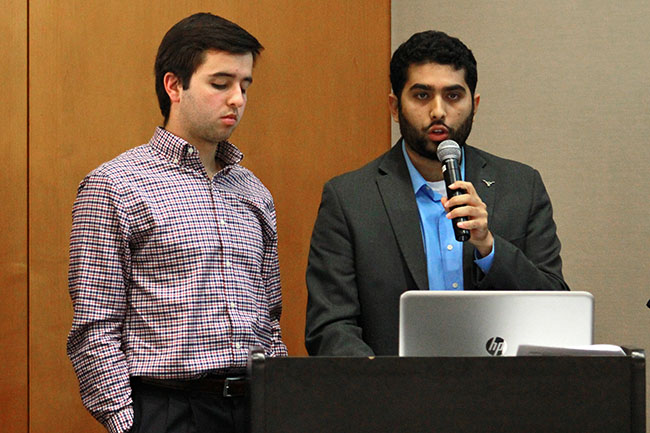Student Government introduced legislation Tuesday opposing a national bill that would force sexual assault survivors to decide whether to report their assault within 48 hours.
H.R. 3403, or the Safe Campus Act, would only allow colleges and universities to investigate allegations of sexual assault if the survivor reports the incident to law enforcement within 48 hours of the crime. According to the bill, if it is not reported immediately to the police, the university has only 15 days to take certain actions such as helping the survivor switch classes or dorms.
Taral Patel, SG chief of staff and co-author of the legislation, said SG members, among others, decided to write the legislation because they think the House bill will discourage survivors of assault from reporting incidents — both because of the short time frame students have to report and because it would limit the University’s ability to help students.
“This legislation would help stifle the voices of many survivors who would want to report to the University and would go strongly against the efforts of groups … who are working hard to make sure more students break free from the stigma created by rape culture,” Patel said. “This skyrockets the level of difficulty for universities to suspend or sanction rapists until the incident is reported to the police, charges are pressed, the case is brought to trial and a conclusion to the case is reached.”
The Safe Campus Act is backed by the Fraternity and Sorority Political Action Committee (FSPAC), a national lobbyist committee.
Lee Lueder, business senior and president of UT’s Interfraternity Council, said he supports the action taken by SG against the bill and called the name of the bill — Safe Campus Act — ironic because he thinks it would not keep anyone on campus safe.
“I can speak on behalf of the IFC to say that we are not associated with whoever is funding it, we are not making any contributions, and we definitely don’t make contributions to the FratPAC,” Lueder said. “It is embarrassing from a public-perspective standpoint that a group, which on the face of it represents fraternities, is the one that is backing it.”
Rachel Osterloh, president of the Senate of College Council and co-author of the legislation, said she hopes SG’s legislation will send the message that students are not okay with the Safe Campus Act.
“As a campus community, we have a moral obligation to protect our survivors of sexual assault,” Osterloh said. “The rates of reporting sexual assault are low. By mandating that survivors of assault report to the police in addition to their university, it restricts the survivors’ options for reporting on their own terms.”
Patel said the legislation cites recent results from the Association of American Universities’ sexual assault survey in order to give explain why the House Bill should be an important issue to students.
Patel said if the resolution is passed, it will be sent to University officials. Patel said he hopes this bill will impact the University’s stance on the controversial legislation.
“A lot of organizations and communities at UT and across the nation support going against this bill called the Safe Campus Act, because it truly doesn’t seem to make campus safe,” Patel said.





















